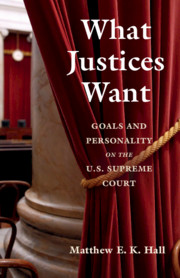Book contents
- Frontmatter
- Dedication
- Contents
- List of Figures
- List of Tables
- Acknowledgments
- 1 Who They Are and What They Want
- 2 Goals and Personality
- 3 Measuring Justice Personality
- 4 Agenda Setting
- 5 Opinion Assignments
- 6 Intra-Court Bargaining
- 7 Voting on the Merits
- 8 Separate Opinions
- 9 Behind the Black Robes
- Appendix A Agenda-Setting Analysis
- Appendix B Opinion Assignment Analysis
- Appendix C Intra-Court Bargaining Analysis
- Appendix D Voting on the Merits Analysis
- Appendix E Separate Opinion Analysis
- Notes
- Index
Appendix A - Agenda-Setting Analysis
Published online by Cambridge University Press: 22 August 2018
- Frontmatter
- Dedication
- Contents
- List of Figures
- List of Tables
- Acknowledgments
- 1 Who They Are and What They Want
- 2 Goals and Personality
- 3 Measuring Justice Personality
- 4 Agenda Setting
- 5 Opinion Assignments
- 6 Intra-Court Bargaining
- 7 Voting on the Merits
- 8 Separate Opinions
- 9 Behind the Black Robes
- Appendix A Agenda-Setting Analysis
- Appendix B Opinion Assignment Analysis
- Appendix C Intra-Court Bargaining Analysis
- Appendix D Voting on the Merits Analysis
- Appendix E Separate Opinion Analysis
- Notes
- Index
Summary
Table A.1 reports the results of the agenda setting model. The data consist of cert votes by 12 justices in a random sample of 358 paid nondeath penalty petitions coming out of a federal court of appeals that made the US Supreme Court's discuss list during the 1986 through 1993 terms. The data and the control variables were derived from Black and Owens’ study of Supreme Court agenda setting. The dependent variable is each justice's cert vote in each case (1 = grant; 0 = deny; N = 3, 002). Because the dependent variable is dichotomous and cert votes by the same justice may be interdependent, I employ a multilevel logistic regression model with random intercepts for justice. The model includes the justices’ SCIPEs for the Big Five (Extraversion, Conscientiousness, Agreeableness, Neuroticism, and Openness), as well as the following control variables and interaction terms:
• The number of amicus curie briefs filed in each case before cert was granted, standardized within the term the case was filed (Amici Attention), as well as an interaction term between this variable and Extraversion.
• Dichotomous indicators for the number of grant votes cast by other justices, as well as interaction terms between each indicator and Agreeableness. I use dichotomous indicators rather than a continuous variable to account for potential nonlinear effects.
• A dichotomous indicator taking on the value one if the United States asked for review either as petitioner or through participation as amicus curiae and zero otherwise (US Supports Petition), as well as an interaction term between this variable and Neuroticism.
- Type
- Chapter
- Information
- What Justices WantGoals and Personality on the U.S. Supreme Court, pp. 153 - 156Publisher: Cambridge University PressPrint publication year: 2018



